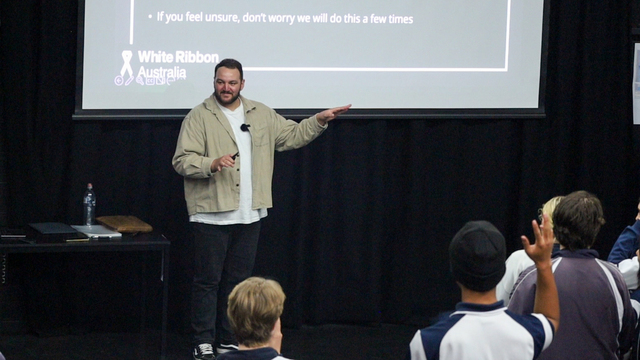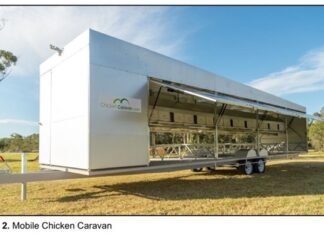As a long-time advocate for men’s behaviour change and primary prevention of Domestic and Family Violence in Queensland, it was only natural that Dean Cooper joined White Ribbon as a senior member of their team, providing a lot of transformational change in the way this organisation works with the community.
The White Ribbon movement was originally founded in 1991 after a mass shooting event at a college campus in Canada.
A male gunmen killed 14 women and injured others.
Following this event, men on campus began utilising the White Ribbon as a symbol to demonstrate allyship alongside women and a movement to engage men and boys in conversations about ending violence against women.
White Ribbon Australia was founded in 2007 and to this day continues to engage men and boys in preventing violence against women.
Dean said White Ribbon Australia has proudly been at the forefront of engaging men in dialogue to see men’s violence towards women as a men’s issue and not one that women are to tolerate, endure or fix.
“Whether that’s through speaking with workplaces, delivering training, or via developing free resources for people who want to support someone experiencing violence or have a difficult conversation with a friend about their behaviour,” he said.
“We recognise that men’s violence against women is a difficult and confronting topic for men to engage in, but through our engagement with men we see many want to play a role in preventing violence against women but don’t know where to start or what exactly that role could look like.
“White Ribbon Australia works to mobilise and empower men, many who don’t perpetrate or excuse violence, to have confidence that they have a place in the conversation and are part of the solution.
“We believe that men and boys don’t know what they don’t know, and when they know differently, they can do better.
“Particularly, when it comes to young boys we don’t blame or shame them for the statistics we see.
“However, we do acknowledge they have inherited a society with these issues and encourage them to think of exactly how they are going to spend the inheritance or what they will invest in to achieve different outcomes.”
Dean highlighted that White Ribbon Australia was currently expanding their team to meet the rising demand and expand their reach and offerings of primary prevention initiatives.
They have a suite of education and training programs for workplaces, schools, communities, and professionals working with our young people.
For Dean, his favourite initiative is the You Can Ask That workshops which allow participants to submit questions they wouldn’t feel comfortable to ask in an open forum.
“This survey allows us to talk with men and boys, and not at them.
“Our subject matter experts then answer these questions in an engaging way through big and small group discussions and interactive activities.
“We also utilise pre-session multiple choice questions to measure participants understanding of the issue, thoughts on why men use violence towards women, and barriers to being an ally in this space.
“This allows us to be transparent and share what others think around them and often reveals there are more allies and people wanting to create a safer culture than what is initially assumed but just don’t know where to start.
“Our workshops provide practical tips to respectfully challenge others who show disrespect for women or justify, deny, or excuse men’s violence towards women.
“We educate participants to develop ways to hold people gently accountable in ways which is safe for them and isn’t confrontational, shaming, or embarrassing for the person using the behaviour.
“We know a shamed brain doesn’t learn and we don’t want to create further division on the topic so we look at ways to call other in, as opposed to out.”
Ultimately for Dean, it means a lot to him to be a part of White Ribbon Australia and engaging with men and boys.
He highlights that looking back on his younger self, he would never have thought he would be travelling Australia facilitating workshops on preventing men’s violence towards women.
“Originally, I wanted to play rugby union professionally and later transitioned to following a career with corrective services where I worked with men who were in prison for violent offences.
“Quite concerningly, what I learned was a lot of men I worked with who were physically and sexually violent towards women would tell jokes I had told and used chants I had led in a rugby club environment.
“It was my full circle journey to realising not all disrespect leads to violence, but all violence starts with disrespect.
“It was through working with men who were on the extreme ends of the violence spectrum I saw the community absolutely play a role in preventing a culture which allows violence against women to occur.
“Whilst I was holding these men accountable in behaviour change programs, I recognised they needed messages of accountability in the pubs, sports clubs, and communities they went back into.
“In the same instance, it has been fantastic to see so many schools wanting to educate their students on the issue and we definitely see from the young people we engage that they are aware of how significant the issue is.
“This is a big improvement from my parents’ generation and also my time in school where we never once discussed men’s violence towards women.
“Through talking with young people, we are seeing the impact social media and algorithms which push misogynistic and harmful content are having.
“We are also seeing victim blaming and justification for certain behaviours, however after a few of our activities where they are challenged to take different perspectives, we see the light bulbs click as to how easily they can be influenced by online content.”
Working with boys in year nine to 10 through White Ribbon Australia, Dean is seeing a curiosity as to why men use violence and how they can play a role in prevention.
While in the year 11 and 12 boys they see a real inquisitive response to the practical aspects of relationships.
“We regularly receive questions such as ‘how do I start a conversation about safety and respect with my girlfriend?’ and ‘I heard open communication is important to building trust but what other things can I start doing?’
“It’s great to see young boys seeking practical ways to do things differently and nurture respectful and safe relationships.
“These boys aren’t the problem- they’re asking the right questions to become part of the solution.”









